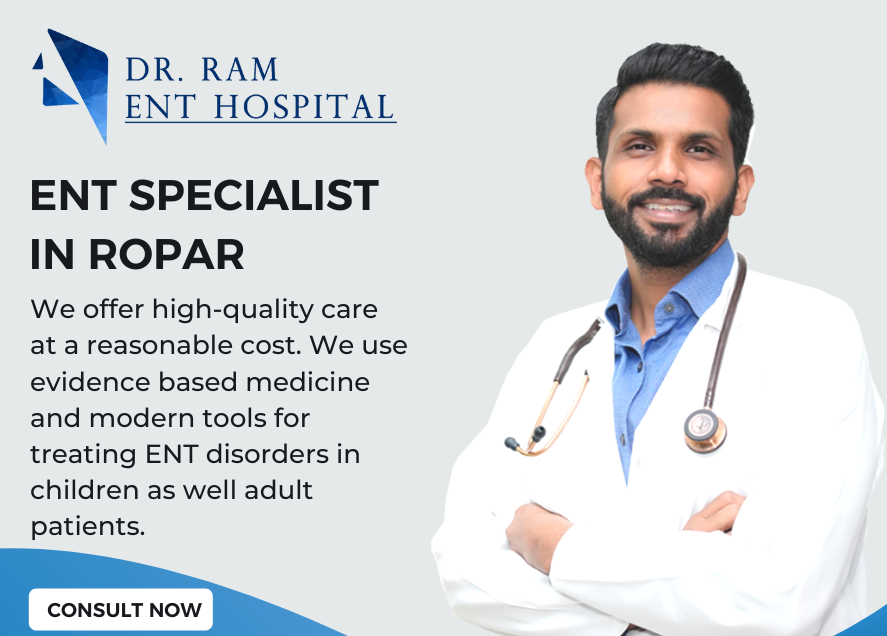Not all problems are suitable for treatment by general practitioners. Certain disorders like recurrent ear infections, hearing related problems, nasal allergies and or polyps, voice disorders, snoring, thyroid disorders,and dizziness require the consultation of a specific health professional: the ENT (otolaryngologist) surgeon. As a specialist in ear, nose and throat disorders, h/she will be able to diagnose and treat your various ENT and head & neck specific problems more efficiently.
What is an ENT?
ENT is the acronym for otolaryngologist. This term is derived from the Greek:
- oto: ear
- rhino: nose
- laryn: throat.

In the early years an ENT specialist only took care of these three parts of the body. Today, a ENT specialist apart from treating regular ENT related problems also specialises in treating vertigo, thyroid disorders snoring and also intervenes in the various head and neck disorders. Whatever the area of intervention, the doctor’s role is not only to make a diagnosis but also to offer the most appropriate care.
These different body parts with their unique anatomy and physiology can present with a wide variety of pathologies.The diseases are very varied, and so are the treatments. It can be taking medication, surgery (restorative or reconstructive), rehabilitation or fitting a prosthesis or implant.
Due to the complexity of the areas of intervention, there are also more and more sub specializations within ENT. Among these are otology, rhinology, laryngology, otoneurology, cosmetic surgery of the head and neck, tumour surgery, allergy & immunology, broncho-oesophagology, etc.
In addition, an ENT Specialist also works in close collaboration with other medical professionals, such as speech therapists, audiologist, occupational therapists, sleep therapist.
This multidisciplinary approach is essential to focus on the patient and his/her various disorders, which can very often be linked.
What is the type of ENT consultation?
The different diseases
ENTsurgeon treats a wide variety of diseases or pathologies due to the complexity of the areas of intervention. In general, ENT specialists diagnose and treat the following conditions
- congenital disabilities;
- tumours;
- infections or inflammations;
- trauma or injury;
- degeneration;
- paralysis.
However, depending on the area, some pathologies are much more common. A patient who consults an ENT can expect an answer from an otolaryngologist expert on the following subjects:
For the throat
The medical consultation with an ENT surgeon is done for the following disorders:
- tonsillitis;
- removal of adenoids;
- voice disorders;
- thyroid and parathyroid surgery (in this case, the ENT must collaborate with an endocrinologist);
- salivary gland tumours or infections;
- tumours of the mouth and tongue;
- voice pathologies;
- stridor (the emission of noise during breathing);
- gastro-laryngeal reflux;
- laryngeal cancer.
For the nose (rhino)
- sinusitis;
- nasal polyps
- nasal deformity;
- loss of smell and taste;
- chronic nasal congestion;
- snoring and sleep apnea;
- rhinoplasty
- Significant nosebleed (if they last more than 10 minutes with drowsiness or dizziness, you must consult urgently).
For the ears (oto)
As a specialized health professional, the ENT treats all disorders related to the ears. For instance :
- ear infections;
- deafness or hearing loss;
- tinnitus;
- dizziness and balance disorders;
- recurrent ear infections;
- otalgia (ear pain).
For head and neck
For several years, ENT practitioners have been extending their skills to the entire head and neck. This is how a specialised otoneurologist treats:
- facial paralysis;
- head and neck cancers, masses or trauma;
- Plastic and aesthetic surgeries (in this case, they provide indications).
To note: Even if the pathologies are very different from each other, certain factors are identified as aggravating. Among these: smoking, excessive alcohol consumption, being overweight.
The course of the consultation with the ENT doctor.
Before consulting an ENT surgeon, it is best to call on your attending physician beforehand. As soon as you have an appointment with the ENT, the consultation takes place in several phases:
- Questioning: the ENT doctor questions the patient to understand the disorder. For this, he asks for the date of onset, the symptoms, the triggering, and the level of discomfort.
- The examination: to make a precise diagnosis, it is useful to carry out an assessment of the affected organs using a spatula, speculum, otoscope.
- Additional examinations: if the first examinations are insufficient, it may be necessary to resort to radiology, fibroscopy, endoscopy or MRI, depending on the case.
- At the end of the consultation: ent specialist gives an initial opinion and prescribes the appropriate treatments. He may also request additional visits to monitor the patient’s condition or to carry out further examinations.



